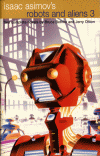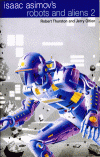This review will most likely contain spoilers for any previous books in the series, read at your own risk.
Toward the end of Alliance, Derek agrees to transport the three shape changing robots to the cannoid inhabited planet that Adam originally emerged from. The title of the book refers to a subplot about a loner named Maverick, which was expelled from a main pack some time ago. His goal is to join PackHome. I really didn’t identify with this character at all. In the meantime the Robots on the planet agree to treat the cannoid inhabitants as humans in order to give themselves a purpose.
Overall this book has a little bit of action, but seems to me to be nothing more than a stepping stone before the final book. I didn’t really enjoy it that much because nothing seemed to really happen. I’m looking forward to the final book to see how all of this will finally be tied together.


